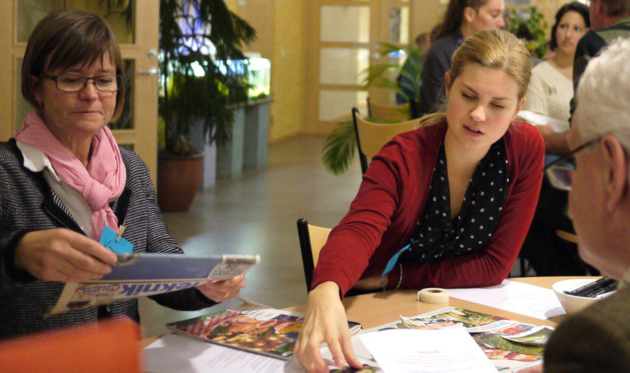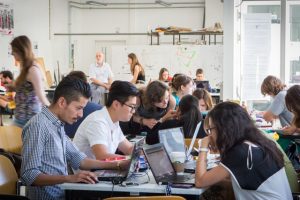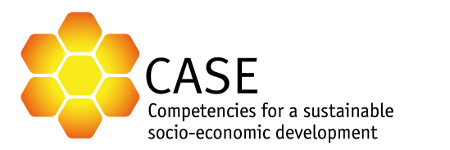 What is it about?
What is it about?

Developing an idea into a business model is the core concept of entrepreneurial projects. Students can experience what it means to become an entrepreneur in a protected, playful, and realistic environment. In – ideally interdisciplinary – teams, they strive for tackling real-life problems through a business approach.
During this incubation process, they are accompanied by experts acting as mentors or coaches. The format allows the participants to decide whether they pursue their idea into realization or see the course only as a valuable learning experience.
Define the entry conditions for students – reliable criteria are e.g. with a specific idea, as a team. A careful selection of participants can be achieved through a motivation letter including their idea or field of interest.
The integration of practitioners may be realized either by choosing relevant personalities from you network or by collaborating with an external partner providing start-up support, e.g. an incubator. The format may vary depending on availability, field of activity, location and could be inspired by e.g. guest lectures or excursions.
The starting phase is crucial for the atmosphere and dynamics of the whole group. Ideally, start with a kick-off event that brings the participants together and makes the present ideas visible. It is the moment of clarification where to start from and what to aim for. For the final goal of the course there are multiple options: a viable business model (minimum requirement), a solid business plan, a documented prototype or a detailed proposal for funding.
Leaving the usual (university) environment for 3-5 days to work e.g. in a rural area raises the attention and puts the focus on the entrepreneurial project. Besides intensifying the learning process, such a “Start-up Camp” creates a special atmosphere, builds trust and strengthens the commitment of the participants.
The path from idea to business is marked by an iterative process of development. The Business Model Canvas is a popular tool to support this process; it has been adapted by integrating ecological and social impact to the Sustainable Business Model Canvas.
Students work on all elements of the business model simultaneously, considering interrelations and maintaining coherence. The holistic view on the business activity includes reflections on the ecological and social impact. These can be analyzed and demonstrated with the help of the CASE Sustainability Performance Tool or the input-output-outcome-impact (iooi) method.
Testing the hypotheses within the business model is an essential step. Depending on the time resources available, a reality-check is made in the form of short interviews or prototyping. A prototype is a small-scale realistic example of the core product and/or service. The tested aspects are evaluated and serve for improvement of the business model.
A viable business model should be the minimum result of entrepreneurial projects. The potential consecutive step is the transformation of the model into a more detailed and operational business plan. In accordance with the elements of the business model, it further includes concrete milestones, a solid financial planning and a clear communication strategy.
A highlight of the course usually is the final presentation. It makes all the efforts visible and offers another possibility to receive feedback from a broader audience. Therefore, a public event represents the ideal solution, also to attract external guests (e.g. investors) and potential future participants.

Meeting Sustainable Entrepreneurs at Ekocentrum Gothenburg
Methods for Practical Entrepreneurship
Assessing and evaluating ideas is a core activity for entrepreneurs. In this course, students interact with external idea providers to train their ability to identify, evaluate and explore the potential of new ideas. In addition, students are provided with knowledge, methods and tools for handling these processes.
Interdisciplinary teamwork “in the Garage”
Garage
Students learn to implement instruments and methods that help in discovering, evaluating and realising technology-oriented, explorative business ideas. They have the possibility to bring in their own business ideas and are supported in each step by the course instructors and by external mentors, with the goal of transforming an initially rough idea into a convincing businessconcept. At the end of the term the students’ start-up-teams present their business ideas in front of potential investors and other experts. Interdisciplinary teams from three different Austrian universities allow – similar to real start-up situations – various perspectives, skills and competencies to shape the business idea and implementation. Read more about the Garage course
 Project examples
Project examples
Get inspired by further project examples implemented with various stakeholders (companies, GOs, NGOs etc.) in five different European cities – Vienna/AT, Vechta/GER, Brno/CZ, Gothenburg/SWE and Bolzano/IT.
View project examples
 Benefits
Benefits
- Discovering, evaluating and realizing innovative business ideas
- Fostering entrepreneurial mindset
- Learning to understand and handle risks
- Personal development by taking over responsibility
- Creativity and resourcefulness
- Contagious enthusiasm between students and coaches
 Success factors
Success factors
- Orientation towards implementation of students’ own ideas
- Creativity-promoting open space within a clear framework
- Diversity of knowledge and competences of partners/coaches
- Entrepreneurial spirit of the cooperation partners
 Challenges
Challenges
- Matching student projects with relevant cooperation partners
- Determination of limit of the course and extracurricular activities
- Embedding of sustainability and related concepts
- Integrating a “start-up camp” (several days off-university site)
 Supporting material
Supporting material
General overview
Tools
Templates
 Contacts and experts
Contacts and experts
- Gabriela Schaad, University of Gothenburg, Sweden
- Michael Ambros, University of Natural Resources and Life Sciences, Vienna, Austria

 Phase 1 – Planning & Preparation
Phase 1 – Planning & Preparation
 Phase 2 – Starting Phase
Phase 2 – Starting Phase
 Phase 3 – Business Model Development
Phase 3 – Business Model Development
 Phase 4 – Business Planning
Phase 4 – Business Planning
 Phase 5 – Final Presentation
Phase 5 – Final Presentation
